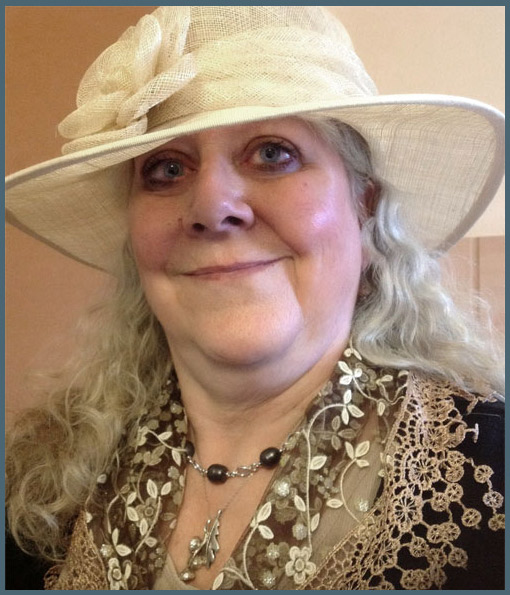 Authors often talk about the heroines in their books. You may have caught me mentioning Carina and Aurelia from time to time. (Whistles in the air) But a conversation about heroines and their heroes led to something else… Authors often talk about the heroines in their books. You may have caught me mentioning Carina and Aurelia from time to time. (Whistles in the air) But a conversation about heroines and their heroes led to something else…
This post was inspired by author Helen Hollick. It’s mainly in her voice with bits and pieces from me and my writing friend Anna Belfrage. Over to Helen…
“Author Anna Belfrage, during a recent conversation mentioned a thought about the real heroines behind the fictional heroines. I wondered if heroes should also be included, but March is Women’s History Month, so let’s stick to the ladies here. (We can spotlight the men another time to balance the books.)
In this instance, Anna was referring to the writer as the heroine – the author, the person tapping away at a keyboard or scribbling with a pen on paper ( ).
The fictional heroine usually goes through hell and back in a story, or at least some sort of trauma or disaster or romantic upheaval, or complication or… well, you get the picture. But what about the writer who is creating that character, that scene, that story? Is it a case of sitting down at a desk from 9-5 Monday to Friday, tapping out a few thousand words a day, Other Half supplying a cup of tea/coffee/wine/gin on the hour every hour? Those several thousand words flowing freely, the plot flashing along, scene after scene with no wavering? Novel finished, a dutiful re-write, check for the occasional missed blooper, then off to the editor for a quick once-over?
Oh, I wish!
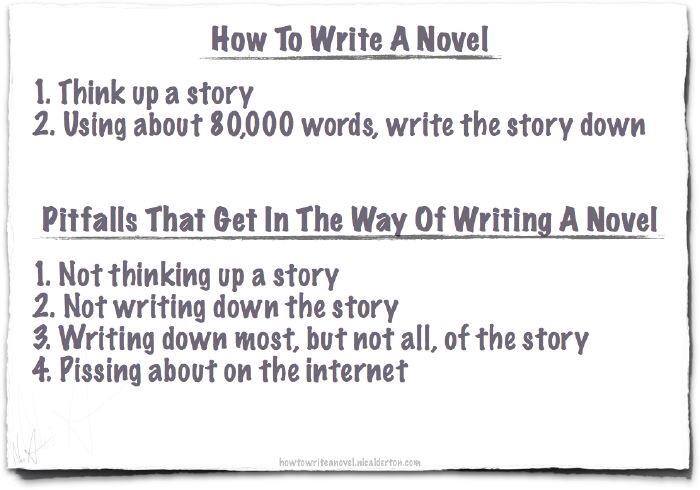 Courtesy of Helen Hollick The only bit of the above that is mildly true for me personally is the tea/coffee appearing a couple of times a day in between countless re-runs of Westerns on the TV which my husband watches with avid fascination, apparently completely unaware that he watched the same John Wayne/Jimmy Stewart et al movie the day before. And the day before that.
Meanwhile, I struggle during the dark, miserable days of winter. Even the effort to get out of bed some dank, dark, damp mornings is hard work for those of us who suffer from S.A.D. (Seasonal Affective Disorder – basically, a desire to hibernate during winter.) To be creative, to find the words to write when I can’t even remember the cat’s name (I am not joking!) is hard work.
Then there is the research, particularly for historical fiction writers who need to know the facts of a period or event before they can even start writing Chapter One. All genres need a certain amount of research, even fantasy and science fiction – possibly even more so, because to make the unbelievable believable the facts have to be correct, otherwise all the believability goes out the window.
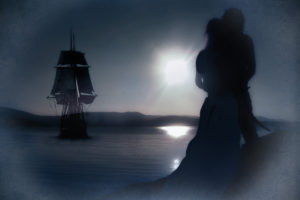 For writers, meeting our new characters – male or female – is not always a walk in the park, although for me, I did meet my pirate hero, Jesamiah Acorne, on a drizzly-day Dorset beach. Long story, cut short: I was walking on the beach thinking up ideas for Sea Witch. Looked up and saw a vision of Jesamiah. Might have been my imagination, might have been a spirit from the past – no matter, I saw him. In full pirate regalia. And immediately fell in love. For writers, meeting our new characters – male or female – is not always a walk in the park, although for me, I did meet my pirate hero, Jesamiah Acorne, on a drizzly-day Dorset beach. Long story, cut short: I was walking on the beach thinking up ideas for Sea Witch. Looked up and saw a vision of Jesamiah. Might have been my imagination, might have been a spirit from the past – no matter, I saw him. In full pirate regalia. And immediately fell in love.
 Alison says hers have been swishing around in her head for decades ever since she trod on a Roman mosaic floor at age eleven! Firmly gripped by the Romans, she started wondering what the world would have been like if a tiny part of Rome had survived… Alison says hers have been swishing around in her head for decades ever since she trod on a Roman mosaic floor at age eleven! Firmly gripped by the Romans, she started wondering what the world would have been like if a tiny part of Rome had survived…
 As for Anna, she blames it all on her husband. It was all because of his family history, which involved fleeing Scotland in 1624 due to religious persecution. She started reading up on the 17th century and fell in love. (Why the 17th century? A declaration of love.) One day, Matthew Graham stepped out of her murky imagination and demanded she tell his story, which she has done, over several books. As for Anna, she blames it all on her husband. It was all because of his family history, which involved fleeing Scotland in 1624 due to religious persecution. She started reading up on the 17th century and fell in love. (Why the 17th century? A declaration of love.) One day, Matthew Graham stepped out of her murky imagination and demanded she tell his story, which she has done, over several books.
Our characters get under our skin, into our hearts, minds, lives and very being. When it is time to finish the book, or a series – oh, the heartache of saying goodbye and letting them go! To create believable characters, to bring them alive, to make them look, feel, behave, sound real, to do real (even if they are impossibly over-the-top real) things takes dedication, skill, determination and courage.
Yes. Courage.
Writing can be a hard taskmistress. We slog away in our studies, corner of a room, spare bedroom or wherever, trying to get a paragraph – a sentence – right. We edit, re-edit and edit again and again. We spend hours writing a scene, then delete it because it isn’t good enough. I have deleted entire chapters. We wake up with our characters, walk, live, play, think of, go to bed with them (No, not that sort of ‘go to bed’!) They are there with us 24/7 because if these fictional people are real to us, then they will become as real to our readers. In theory.
I am not being sexist here, but I do think women writers have a tougher time of it than do the men. Admittedly, I am talking in general here, but many women writers already have a full-time 24/7 job of bringing up children and organising the family; at least this was so thirty years ago when I gave up the ‘hobby’ of scribbling my ideas and got on with attempting to do it properly with the end goal of being published in mind. Often it is the woman who gets the kids off to school, does the housework, the shopping, the laundry, goes to her own job, collects the kids from school, cooks the dinner, gets the kids to bed… We grab coffee breaks or the bliss of a quiet hour in the evening to get that next paragraph written. I’m not saying that the blokes in between work and chores also have to snatch those golden moments where they can sit and write, but I’d wager that many an established male writer wanders off to his study in the morning, saunters out at lunchtime, strolls back to his desk to emerge around six-ish to watch TV. Lunch, dinner, clean shirts and tidy house happening via the Magic House Fairy.
At least, now, women writers can create our stories under our own name. How many of our great female writers from the past had to invent a male pseudonym to be heard and published? I think the term ‘heroine’ definitely applies to these brave and determined ladies of the past.
So why do we do it? Why do we spend hours doing this darn silly job of writing fiction? It’s not for the money that’s for sure. Very few writers outside the top listers make enough to equal a suitable annual wage. So why?
 Julian Alps, Slovenia by Petar Milošević (Creative Commons BY-SA 3.0) Ever heard the answer to a question put to Sir Edmund Hilary when he had successfully climbed Everest in 1953?
“Why did you want to climb it?”
His answer? “Because it’s there.”
Well, for us, for fiction authors, we write the words because they are not there…”
————-
Thank you, Helen, for this wonderful post. Um, please keep writing!
To celebrate Women’s History Month, and to show you what we actually produce, I’m giving away a signed paperback copy of INSURRECTIO, featuring the ever brave (and ever fallible) Aurelia Mitela as she tries to battle the rising tide of a populist demagogue. Of course, the struggle is always personal as well as political…
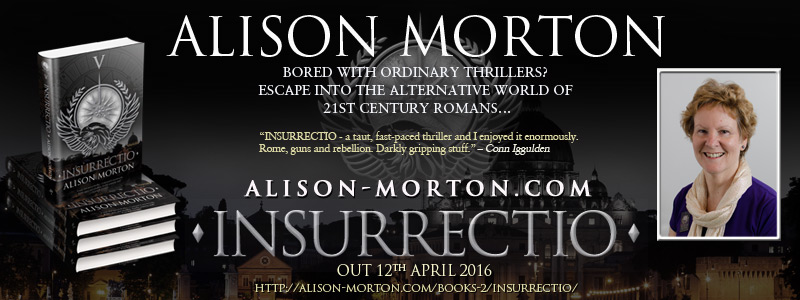 INSURRECTIO giveaway Just leave a comment below by 30 March.
The draw will be made on 31 March.
Plus, plus, plus: Helen and Anna are also offering a giveaway of one of their books to celebrate this special month! Why not pop over to Helen‘s and Anna‘s sites to discover what they are giving away.
Helen’a books:
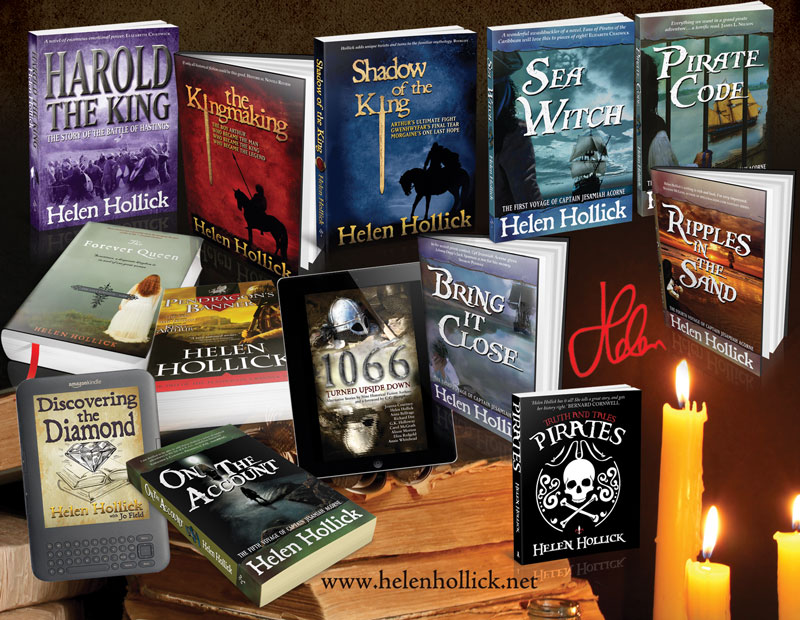
Anna’s books:
The Graham Saga: http://myBook.to/TGS
The King’s Greatest Enemy: http://myBook.to/TKGE
Alison Morton is the author of Roma Nova thrillers INCEPTIO, PERFIDITAS, SUCCESSIO, AURELIA and INSURRECTIO. The sixth, RETALIO, will be published in Spring 2017. Audiobooks now available for the first four of the series
Find out more about Roma Nova, its origins, stories and heroines… Get INCEPTIO, the series starter, for FREE when you sign up to Alison’s free monthly email newsletter
If you enjoyed this post, do share it with your friends!Like this:Like Loading...
 Fed with with the news and weather? Low energy and bored with most things? Eating more chocolate? Even though brilliant December days lighten the feeling, many of us dislike that grey dull period stretching from dismal November to that liver-yellow time in February and view with relief the first flower burst in spring. Fed with with the news and weather? Low energy and bored with most things? Eating more chocolate? Even though brilliant December days lighten the feeling, many of us dislike that grey dull period stretching from dismal November to that liver-yellow time in February and view with relief the first flower burst in spring.
But for a small proportion of us, it takes over our lives. We actively dread the shortening of the days. Anxious eyes note the day length on the clock each evening. Cosy evenings around an open fire don’t do it for us. Winter means darkness, the withdrawal of life’s light, a shutting down of our being. Christmas is a brief respite; a sugar, carbohydrate and alcohol push with family and friends, but it’s soon gone. Valentine’s Day passes by in a distant drift; it’s happening out there, not inside your own world.
If this sounds self-pitying and sentimental, it’s a taste of what really happens. We’re not looking at winter blues, but at a blight on daily life for several months of the year. You lose direction, everyday tasks become onerous and complicated, even simple regular self-care and time slips out of your grasp. You almost can’t be bothered to make a cup of tea. For some, including me, eyesight deteriorates temporarily. Functioning on two out of four pistons is quite a good analogy.
The renowned Mayo Clinic lists the symptoms of seasonal affective disorder more objectively:
Symptoms specific to winter-onset SAD, sometimes called winter depression, may include:
- Irritability
- Tiredness or low energy
- Problems getting along with other people
- Hypersensitivity to rejection
- Heavy, “leaden” feeling in the arms or legs
- Oversleeping
- Appetite changes, especially a craving for foods high in carbohydrates
- Weight gain
What does this mean as a writer?
The first sign is that you lack the natural obsession to pour out words onto the keyboard. Your usually crap typing deteriorates to unbelievably bad levels. You miss things out, you forget how to spell. You forget to note down research sources and you even lose the plot – literally. You forget to answer emails and miss blogpost deadlines. And you fret about it, castigating yourself. That is, when it’s all passing you by as just too much effort.
Any day when you see poor sales adds to the growing black dog feeling as we lurch towards mid-winter. You become locked into your own world of failing energy. Your nearest and dearest see a moody, unsmiling person who has lost her enthusiasm for anything and gained multiple sensitivity antennae. February is worst as you’ve had months of light deterioration. And both my (thankfully short) bouts of clinical depression began in late January.
Why?
Why does this happen to otherwise energetic, well-motivated and cheery people? Nobody really knows! It’s probably one of those Stone Age things when sensible people retreated into the cave for winter hibernation.
Three things may play a role:
- Your biological clock (circadian rhythm). The reduced level of sunlight may disrupt your body’s internal clock and lead to feelings of depression.
- Serotonin levels. A drop in serotonin, a brain chemical (neurotransmitter) that affects mood and which may trigger depression.
- Melatonin levels. The change in season can disrupt the balance of the body’s level of melatonin, which plays a role in sleep patterns and mood.
Seasonal affective disorder (SAD) is considered a subtype of major depression. Not being dramatic, you should take SAD signs and symptoms seriously. As with other types of depression, SAD can get worse and lead to even more serious problems if it’s not treated. These can include social withdrawal, school or work problems, substance abuse or even suicidal thoughts or behaviour.
So what can we do about it?
The first thing is recognising it for what is. It’s not you losing your marbles or at best feeling a bit down on every dull day. Obviously, it’s best to see your doctor about this, but I’ve found these ways of coping.
- Getting outside even on the grottiest winter day. If it’s one of those crisp sunny days, then that’s an enormous bonus. Find somewhere sheltered to sit and lap up the sun.
- Exercise (I know!) But if you can go for a walk as well on that sunny day you can almost feel normal. And even indoor exercise can lift your mood, even temporarily. And all that sweating, breathlessness and protesting muscles give you something different to moan about. More seriously, it can depress your ravenous appetite and keep weight gain down.
- Indoors, work near a window, grab the sunniest room in the house for your writing room.
- Lightbox. Now the good ones are not cheap, but mine works for me, especially if I use it in the first hours of the morning, so I regard it as an investment that has changed my life.
- Attitude and self-discipline (also known as grit). These are the hardest; true uphill work. You have to make your brain take control. If you can set some goals/write a to-do list, establish some kind of structure to your day, even set events in your diary, it helps keep the muddle away.
- Self care; rest, keeping warm, tea, vitamins, yoga, balanced meals at regular times, days out. Have a long, hot bath – great for both warmth and relaxation.
- Don’t nag yourself and don’t listen to any horrible little imagined voices saying words like ‘wimp’, ‘pathetic’, ‘ought’, ‘should’, ‘lazy’ or similar.
- Visualise: I know, it’s a bit touchy-feely, but imagine (or remember) lying somewhere pleasant soaking up so much sun that it seems to get right into your bones. Twenty concentrated minutes of that can stimulate the same responses in your body as the real thing. (Apparently it also works for chocolate cravings.) Well, it seems to make me feel a little less down.
 I’m not a doctor, so please don’t take what I do as any kind of treatment. I’ve just learnt over the years that these things help me. I’m not a doctor, so please don’t take what I do as any kind of treatment. I’ve just learnt over the years that these things help me.
Update 2021: These days I’ve added a daily Vitamin D tablet into the mix. Even if it just produces expensive wee, I feel it might do me some good.
Update January 2023: My new general practitioner gave me 6 months’ worth of concentrated Vitamin D taken in a single dose each end of month. Seems a bit sledgehammer approach, but I’m not arguing.
But nothing makes me feel happier than when that first daffodil bursts out of its green sheath into yellow glory.
The long days will have returned.
Alison Morton is the author of Roma Nova thrillers – INCEPTIO, CARINA (novella), PERFIDITAS, SUCCESSIO, AURELIA, NEXUS (novella), INSURRECTIO and RETALIO, and ROMA NOVA EXTRA, a collection of short stories. Audiobooks are available for four of the series.Double Identity, a contemporary conspiracy, starts a new series of thrillers. JULIA PRIMA, a new Roma Nova story set in the late 4th century, is now out.
Find out more about Roma Nova, its origins, stories and heroines and taste world the latest contemporary thriller Double Identity… Download ‘Welcome to Alison Morton’s Thriller Worlds’, a FREE eBook, as a thank you gift when you sign up to Alison’s monthly email update. You’ll also be among the first to know about news and book progress before everybody else, and take part in giveaways.
If you enjoyed this post, do share it with your friends!Like this:Like Loading...
Could you answer 30 personal questions in a public forum? And would you want to? There’s a quiz going round Facebook but just to be different, I thought I’d answer them here!
1. Who are you named after? My first name, nobody, but my second name ‘Mary’ pops up frequently in my mother’s family.

2. Last time you cried? When our cat died.
3. Do you like your handwriting? I think it’s characterful. Everybody else thinks it’s the perfect inline cypher system.
4. What is your favorite lunch? Anything seafood! I also like salad of any kind.
5. Do you have any kids? One son; it’s his thirtieth birthday today!
6. Do you use sarcasm? Moi?
7. Do you still have your tonsils? Nope, nor my adenoids.
8. Would you bungee jump? Probably a bit late – I have a back problem. Possibly when younger…
9. What is your favorite cereal? My own made up muesli.
10. Do you untie your shoes when you take them off? Yes, anything else is a lack of moral fibre. 😉
11. Do you think you are strong? Physically, less than I used to be. Mentally and emotionally, as strong as ever.
12. What is your favorite ice cream? Vanilla, preferably with some nutmeg and cinnamon.
 Courtesy of http://www.saveur.com/best-ice-cream-recipes 13. What is the first thing you notice about someone? Their face.
14. Football or Baseball? Neither – couldn’t care less.
15. What is the least favourite thing you like about yourself? Can’t think of anything in particular, but I wouldn’t mind losing 10 kgs.
16. What colour trousers are you wearing? Black
17. Last thing you ate? Greek yoghurt
18. What are you listening to right now? My husband talking on Skype with his mates.
19. If you were a crayon, what color would you be? Red (or possibly royal blue)
20. What’s your favourite smell? Vanilla
21. Who was the last person you spoke to on the phone? The coordinator of my writing group
22. Favorite sport to watch on TV? None
23. Hair color? Good question!

24. Eye colour? Hazel
25. Favorite food to eat? Chocolate (Of course, it’s a food!)
26. Scary movies or happy? Happy, but it has to be a strong story.
27. Last movie you watched? Sully
28. What colour shirt are you wearing? Black with a white pointillé pattern.
29. Favourite holiday? Warm, good food and some interesting Roman ruins.
30. Wine or beer? Wine, especially the bubbly sort. Cheers!

Alison Morton is the author of Roma Nova thrillers INCEPTIO, PERFIDITAS, SUCCESSIO, AURELIA and INSURRECTIO. The sixth, RETALIO, will be published in Spring 2017. Audiobooks now available for the first four of the series
Find out more about Roma Nova, its origins, stories and heroines… Get INCEPTIO, the series starter, for FREE when you sign up to Alison’s free monthly email newsletter
If you enjoyed this post, do share it with your friends!Like this:Like Loading...
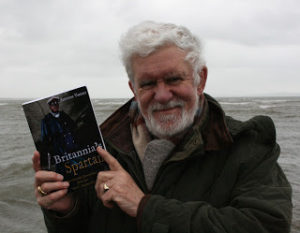 I’m delighted to welcome writing friend Antoine Vanner back to the blog! I’m delighted to welcome writing friend Antoine Vanner back to the blog!
His Victorian naval fiction series – the Dawlish Chronicles – is gathering a very fair wind and steaming to success. I recently reviewed Britannia’s Amazon featured the redoubtable Captain Nicholas Dawlish’s wife Florence. Was she typical of her time? What was a strong Victorian woman like? I’ll let Antoine tell us about one remarkable Victorian who amongst her accomplishments named Nigeria!
In my most recent novel, Britannia’s Amazon, I have written the story from the viewpoint of a female lead-character. As it is set in 1882 I was concerned with reflecting the constraints that society placed on women in that period and the extent to which a clever, resourceful and dedicated woman could still operate successfully within them. I was especially determined not to depict a 21st Century woman, with present-day values and attitudes, in Victorian dress.
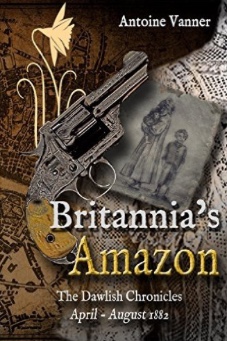 The lives of several women of the time who were successful – against all odds, and facing radically different challenges – were useful sources of inspiration. One of the most interesting for me, since I spent much of my life in the country she coined a name for, was Flora Shaw (1852-1929), who later became Lady Lugard and was also created a Dame (the female equivalent of a Knight) in her own right. The lives of several women of the time who were successful – against all odds, and facing radically different challenges – were useful sources of inspiration. One of the most interesting for me, since I spent much of my life in the country she coined a name for, was Flora Shaw (1852-1929), who later became Lady Lugard and was also created a Dame (the female equivalent of a Knight) in her own right.
Flora Shaw’s origins – and indeed early adult life – gave no indication of what she would afterwards achieve. One of the fourteen children of a British army-officer who would later be a general, and of a mother of French stock from Mauritius, her earliest published work consisted of morally-elevating and conventional children’s literature. She was in her mid-thirties, and still unmarried at a time when the prospects for middle and old-aged spinsters were decidedly bleak, when she found employment as a journalist at the Pall Mall Gazette and at The Manchester Guardian newspapers. The Gazette connection was especially important, since at that time its editor, W.T. Stead, was inventing the concept of investigative journalism and initiating campaigns against child prostitution and other abuses.
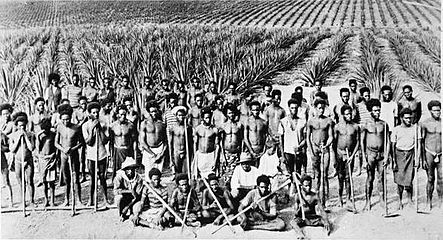 Melanesian labourers on a Queensland sugar plantation 1890s Flora Shaw’s first exposure to international affairs seems however to have been her assignment by The Guardian to cover an anti-slavery conference. Thereafter her focus settled on foreign affairs, especially those related to colonial expansion. This led to her appointment as The Times colonial editor, a hugely prestigious position, given the immense reputation of the newspaper at the time, and she became best-paid female journalist of the era. This role brought her all over the British Empire – including investigation of abuses of Melanesian labour imported to Australia, reports on political and economic matters in South Africa and even a visit to the Klondike at the time of the gold-rush there in the late 1890s.
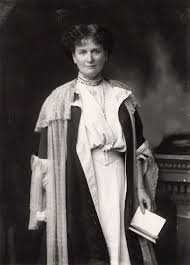 Flora Shaw, when Lady Lugard It is notable that though she wrote initially as “F. Shaw” to disguise the fact that she was a woman, she later identified herself as “Flora Shaw”, a name which was to be synonymous with expertise in political and economic matters. Her South African associations, especially with Cecil Rhodes, resulted in her being investigated by Parliament for involvement in the notorious Jameson Raid of 1895, though she was exonerated.
In the mid-1890s British interests in West Africa fell under several different administrations and it was Flora Shaw who was to argue for consolidation of the largest ones into a single entity. For this she coined the name “Nigeria”, inspired by the huge River Niger that flows through the area. It was not until 1902 however that she was to marry the man – Frederick Lugard (1858-1945) – who was later to unite the separate territories involved under a single administration. In 1960 this became, through independence from Britain, the modern Republic of Nigeria.
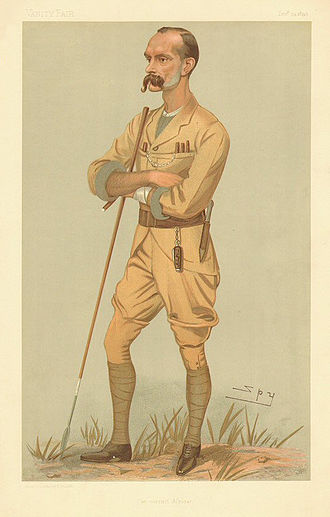 Frederick Lugard – the epitome of an Empire Builder (Vanity Fair, 1895) Lugard – afterwards Lord Lugard – was one of the late-Victorians who was to have an enviable life of adventure and achievement in Africa and elsewhere, and yet he was still playing a valuable role in the League of Nations and the International Labour Organisation in the 1930s, with particular focus on continuing anti-slavery concerns. His most important achievement was however formulation of the concept – unfashionable today – of “The Dual Mandate”, governance of territories by cooperation and division of responsibilities between Britain and local tribal and other potentates. Nigeria was to be the proving ground for the idea and this, combined with the fact that the climate discouraged land-occupation by Europeans, has been influential in making the country what it is today.
The Lugards’ marriage proved be a very successful and equal partnership, with Flora accompanying her husband on various gubernatorial appointments in Nigeria and Hong Kong. In the latter colony, they were instrumental in founding of the University there and during First World War Flora took a leading role in refugee relief that was to earn her Damehood. She died in 1929, leaving her husband to lead an active and useful life into his eighties.
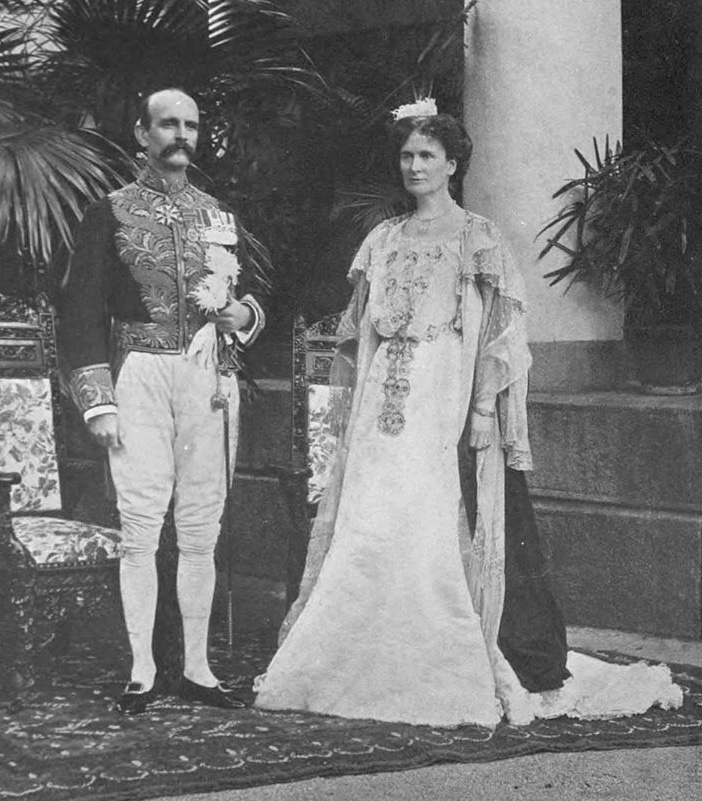 Lord and Lady Lugard in court dress I’ve always been fascinated by this woman who allowed nothing to stand in her way as regards achieving eminence in a profession that was previously, and for much of her life, closed to women. Her opinions and advice were respected at the highest levels and the fact that she was a woman did not detract from them. She exemplified the truth of the dictum “If you think it can’t be done, get out of the way of those who are doing it.” One wonders therefore why she is largely forgotten today and does not figure as an icon of feminine achievement against the odds. The answer may lie in the fact that she was an avowed supporter and unashamed proponent of the imperial dream that is so widely derided today. The Lugard partnership was a counterpart, on the other end of the political spectrum, of Beatrice and Sidney Webb, who are remembered despite their later admiration of Stalinist Russia.
One suspects however that in any era Flora Shaw would have made her mark, a shining example of the belief that anything is possible. Unfashionable today or not, let us honour memory.
We would have welcomed her with open hearts and deep respect in Roma Nova! Thank you, Antoine, for introducing us to strong and capable woman from the 19th century.
Connect with Antoine: Website Dawlish Chronicles blog Twitter
What’s Britannia’s Shark about?
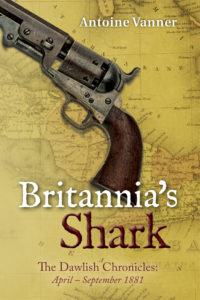 1882 and Captain Nicholas Dawlish RN has just taken command of the Royal Navy’s newest cruiser, HMS Leonidas. Her voyage to the Far East is to be a peaceful venture, a test of this innovative vessel’s engines and boilers. 1882 and Captain Nicholas Dawlish RN has just taken command of the Royal Navy’s newest cruiser, HMS Leonidas. Her voyage to the Far East is to be a peaceful venture, a test of this innovative vessel’s engines and boilers.
Dawlish has no forewarning of the nightmare of riot, treachery, massacre and battle he and his crew will encounter.
A new balance of power is emerging in the Far East. Imperial China, weak and corrupt, is challenged by a rapidly modernising Japan, while Russia threatens from the north. They all need to control Korea, a kingdom frozen in time and reluctant to emerge from centuries of isolation.
Dawlish finds himself a critical player in a complex political powder keg. He must take account of a weak Korean king and his shrewd queen, of murderous palace intrigue, of a powerbroker who seems more American than Chinese and a Japanese naval captain whom he will come to despise and admire in equal measure. And he will have no one to turn to for guidance…
Alison Morton is the author of Roma Nova thrillers INCEPTIO, PERFIDITAS, SUCCESSIO, AURELIA and INSURRECTIO. The sixth, RETALIO, will be published in Spring 2017.
Find out more about Roma Nova, its origins, stories and heroines… Get INCEPTIO, the series starter, for FREE when you sign up to Alison’s free monthly email newsletter
If you enjoyed this post, do share it with your friends!Like this:Like Loading...
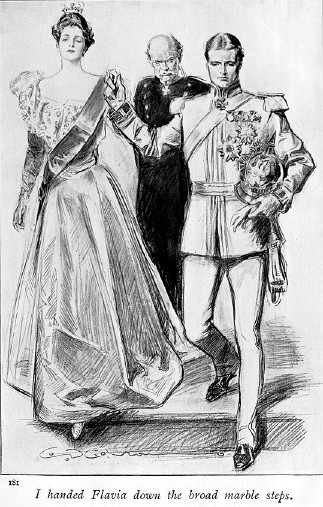 Frontispiece to The Prisoner of Zenda, Charles Dana Gibson Rudolf Rassendyll (Sigh)
Princess Flavia (Aaah!)
Duke Michael (Grrrr!)
Rupert of Hentzau (Wow but grr!)
When I picked up The Prisoner of Zenda at age 12, I was enraptured. It was a torch under the bedclothes job. When it ended I cried, partly from the denouement, partly because it had finished. You know that sense of deep loss when you say goodbye to beloved characters.
Then I discovered Rupert of Hentzau. Thank the gods. I was plunged back into the thrills, romance, courage and sacrifice of Ruritania. And the high moral choice of the hero and heroine.
The stories set between the 1850s and 1880s have been updated and revised; they’ve been made into a BBC television series and feature films, notably the one starring the fabulous Stewart Granger, but what’s between the covers still grabs my mind and emotions.
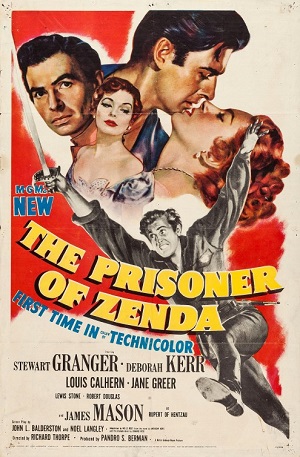 Ruritania itself is an imaginary country in central Europe, a ‘placeholder kingdom’ and is used in academia and the popular mind to refer to a hypothetical country. The author, Anthony Hope, depicts Ruritania as a German-speaking Catholic country under an absolute monarchy, with deep social, but not ethnic, divisions reflected in the conflicts of the first novel, The Prisoner of Zenda. Ruritania itself is an imaginary country in central Europe, a ‘placeholder kingdom’ and is used in academia and the popular mind to refer to a hypothetical country. The author, Anthony Hope, depicts Ruritania as a German-speaking Catholic country under an absolute monarchy, with deep social, but not ethnic, divisions reflected in the conflicts of the first novel, The Prisoner of Zenda.
Hope’s novels resulted in ‘Ruritania’ becoming a generic term for any small, imaginary European kingdom used as the setting for romance, intrigue and the plots of adventure novels. It even lent its name to a whole genre of writing, the ‘Ruritanian romance’.
Such stories are typically centered on the ruling classes, almost always aristocracy and royalty, or as in Winston Churchill’s novel Savrola the dictator in the republican country of Laurania who is overthrown. The themes of honour, loyalty and love predominate, and the works frequently feature the restoration of legitimate government after a period of usurpation or dictatorship.
 The genre has been much spoofed, mined and copied: GB Shaw’s Arms and the Man, Dorothy L Sayers’ Have his Carcase and Nabakov’s Pale Fire parody elements. In the satire The Mouse That Roared, the Duchy of Grand Fenwick (the title role played by the brilliant Margaret Rutherford) attempts to avoid bankruptcy by declaring war on the United States as a ploy for gaining American aid. The genre has been much spoofed, mined and copied: GB Shaw’s Arms and the Man, Dorothy L Sayers’ Have his Carcase and Nabakov’s Pale Fire parody elements. In the satire The Mouse That Roared, the Duchy of Grand Fenwick (the title role played by the brilliant Margaret Rutherford) attempts to avoid bankruptcy by declaring war on the United States as a ploy for gaining American aid.
Sci-fi writer André Norton borrowed many elements and Ursula K. Le Guin set a number of short stories and a novel in the fictitious and essentially Ruritanian East European land of Orsinia. The Grand Budapest Hotel, a 2014 comedy film is set in the fictional nation of Zubrowka, a central European alpine state teetering on the outbreak of war.
Why does the idea of Ruritania persist and why do the books still attract readers?
Let’s unpick the themes behind the stories…
– There’s romance – the heaviest read genre on the planet – and the ‘world lost for love’ vs. ‘love lost for the world’ conflict
– Thrills, tension, mixed motives, dark plots and evil schemes, turning the screw on our emotions
– And as for action adventure, apart from the storyline of the books, there are chases, sword fights, gun duels, escape by night, dungeons and secret stairways
– The ‘noble Englishman’ idea which we may think is dead – I suggest Jonathan Pine in The Night Manager or even our old friend James Bond keep this one on the front burner
– Exaggerated nature of fictional characters who can be more noble or dastardly than we are
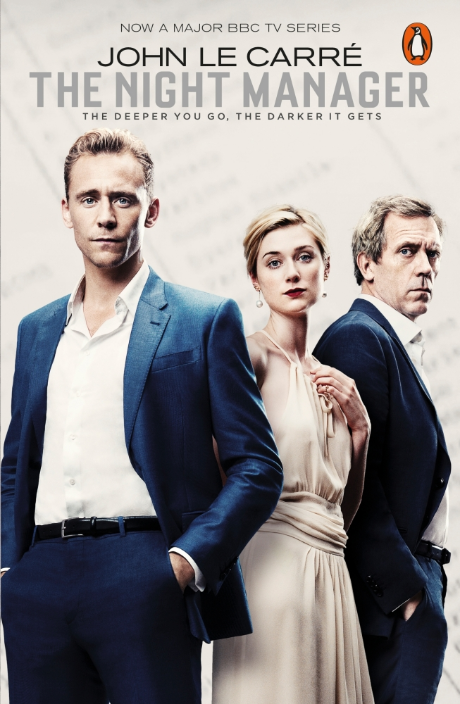 Jonathan Pine – the ‘noble English hero’ Of course, Ruritanian stories have to be plausible by having a good number of connections to our world while maintaining that essential difference, and they have to be consistent within their own world. Nobody likes being jolted out of a fictitious world by sloppy writing.
Now, there are plenty of imagined other worlds, often projecting an existence hundreds or thousands of years in the future or one here on Planet Earth, but after a massive disaster. Both can be pretty grim. But do alternative existences have to be dystopian or post-apocalyptic to be authentic?
Enter Ruritania. The stories are hopelessly old-fashioned, somewhat sexist and rather naive, but they are essentially optimistic. But more than anything they are an escape from the dullness and stress of everyday and emphasise the good guys winning in a morally acceptable way.
Roma Nova is a world away from Ruritania but it does use its core concepts of adventure, romance, honour and taking tough moral decisions. While its stories are set in a small European country, the small state’s Roman-ness, intense struggle through history and egalitarian social system separate it from Ruritania, making it unique, possibly the centre of a new genre even?
While often patrician, Roma Nova’s characters are more fallible, yet more robust and are ready to step over any moral line set by Anthony Hope.
They would eat Rupert of Hentzau for breakfast.
Alison Morton is the author of Roma Nova thrillers – INCEPTIO, CARINA (novella), PERFIDITAS, SUCCESSIO, AURELIA, NEXUS (novella), INSURRECTIO and RETALIO, and ROMA NOVA EXTRA, a collection of short stories. Audiobooks are available for four of the series. Double Identity, a contemporary conspiracy, starts a new series of thrillers.
Find out more about Roma Nova, its origins, stories and heroines and taste world the latest contemporary thriller Double Identity… Download ‘Welcome to Alison Morton’s Thriller Worlds’, a FREE eBook, as a thank you gift when you sign up to Alison’s monthly email newsletter. You’ll also be among the first to know about news and book progress before everybody else, and take part in giveaways.
If you enjoyed this post, do share it with your friends!Like this:Like Loading...
|
Subscribe to Blog via Email
Join 50 other subscribers.
Categories
Archive
|
 Authors often talk about the heroines in their books. You may have caught me mentioning Carina and Aurelia from time to time. (Whistles in the air) But a conversation about heroines and their heroes led to something else…
Authors often talk about the heroines in their books. You may have caught me mentioning Carina and Aurelia from time to time. (Whistles in the air) But a conversation about heroines and their heroes led to something else… For writers, meeting our new characters – male or female – is not always a walk in the park, although for me, I did meet my pirate hero, Jesamiah Acorne, on a drizzly-day Dorset beach. Long story, cut short: I was walking on the beach thinking up ideas for Sea Witch. Looked up and saw a vision of Jesamiah. Might have been my imagination, might have been a spirit from the past – no matter, I saw him. In full pirate regalia. And immediately fell in love.
For writers, meeting our new characters – male or female – is not always a walk in the park, although for me, I did meet my pirate hero, Jesamiah Acorne, on a drizzly-day Dorset beach. Long story, cut short: I was walking on the beach thinking up ideas for Sea Witch. Looked up and saw a vision of Jesamiah. Might have been my imagination, might have been a spirit from the past – no matter, I saw him. In full pirate regalia. And immediately fell in love. Alison says hers have been swishing around in her head for decades ever since she trod on a Roman mosaic floor at age eleven! Firmly gripped by the Romans, she started wondering what the world would have been like if a tiny part of Rome had survived…
Alison says hers have been swishing around in her head for decades ever since she trod on a Roman mosaic floor at age eleven! Firmly gripped by the Romans, she started wondering what the world would have been like if a tiny part of Rome had survived… As for Anna, she blames it all on her husband. It was all because of his family history, which involved fleeing Scotland in 1624 due to religious persecution. She started reading up on the 17th century and fell in love. (Why the 17th century? A declaration of love.) One day, Matthew Graham stepped out of her murky imagination and demanded she tell his story, which she has done, over several books.
As for Anna, she blames it all on her husband. It was all because of his family history, which involved fleeing Scotland in 1624 due to religious persecution. She started reading up on the 17th century and fell in love. (Why the 17th century? A declaration of love.) One day, Matthew Graham stepped out of her murky imagination and demanded she tell his story, which she has done, over several books.































